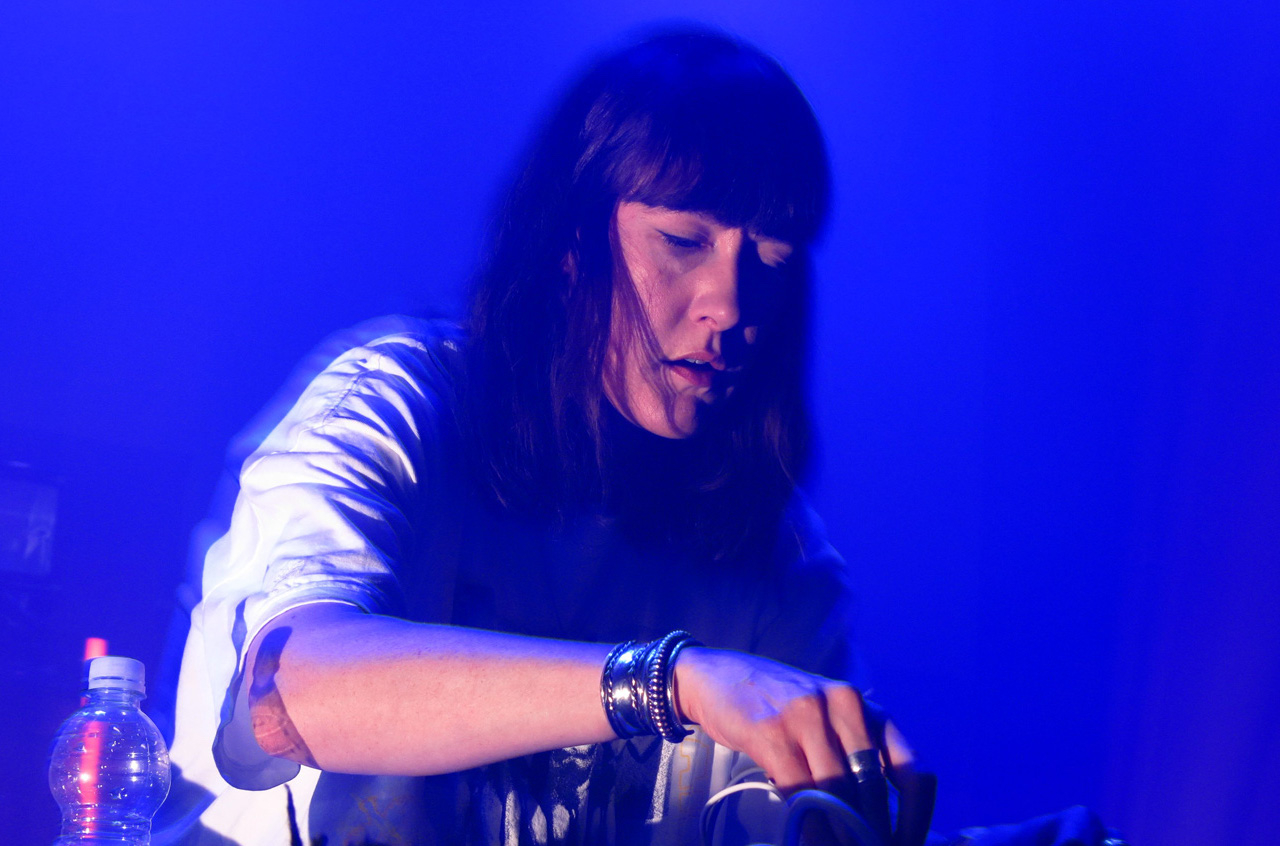- "Watching somebody play live with a laptop is like watching somebody ironing." Laurie Anderson, an "artist in focus" at Rewire, was short and sharp in stating what seemed to be part of the festival's philosophy during her talk on Saturday afternoon. The 70-year-old American avant-garde artist was one of many live performers who brought acoustic instruments, tables full of hardware or impressive visual shows to The Hague festival.
In the eight years it's been running, Rewire has never covered a wider range of musical genres. There was everything from spoken word from Moor Mother, to free jazz from Irreversible Entanglements, to chaabi-inspired desert beats by Ammar 808. The lineup featured many women and non-binary acts, including the members of Discwoman and the Brasilian-born, Amsterdam-based artist Lyzza, who played solo as well as stepped in as a touring DJ for queer artists Mykki Blanco and Faka. The daytime programme, meanwhile, aimed to put electronic music in a historical context, while also exploring themes such as gender roles, online networks, and sense of identity and the self.
Here are five key performances from across the weekend.
Laurie Anderson
Laurie Anderson was a recurring presence throughout Rewire. During her talk, she explained, in a light tone of voice, how she incorporated politically charged subjects, like the situation of Guantanamo-bay prisoners, into her work, and gave three key lessons on life: don't be afraid of anybody, get a really good bullshit detector, and be very, very tender. Later that day, the Dutch Ragazze Quartet performed Anderson's composition "Quartet For Sol," a tribute to her teacher Sol Lewitt. Dizzying shapes were projected on the wall, creating a womb-like atmosphere. People sat on beanbags with their eyes shut to absorb the composition for violins and cellos. The following day, Anderson closed the festival with a special performance in the main church, where she used her violin as an extra voice.
Ammar 808
Tunisian beat maker Sofyann Ben Youssef resembles Egyptian Lover both in style and his instrument of choice: the Roland TR-808. Together with Algerian singer Sofian Saidi, gnawa-player Mehdi Nassouli and Tunisian vocalist Cheb Hassen Tej, he played for a way-over-capacity Paard Van Troje on Friday night. People were pushed onto the walls of the small room and I could hardly keep my feet on the floor. Dressed in a golden sequin jacket, Youssef created a structure of heavy beats, complemented by Saidi's hypnotizing singing and Nassouli's infectious smile. The rapid strumming of the gnawa and bass was answered by handclaps from Hassen Tej. Together they created what sounded like a nocturnal jam session in the desert. The psychedelic, high-energy blend of beats from the Maghreb and the acoustic duet on flutes was completely mesmerizing.
JASSS
For the first track on her upcoming Dekmantel compilation, Lena Willikens chose a production from Silvia Jiménez Alvarez, better known as JASSS. That track, "Little Lines," had a similar vibe to her live set at Rewire on Friday: fragmented voices, hissing hats, frolicking rhythms. The atmosphere was brooding, even grim at times, with distorted synth strokes that sounded like whipping leashes. Looming over her analogue equipment, Alvarez seemed always to be moving forward into her dense soundscapes. The music was mysterious, fractured and a bit subdued, glued together with long synth tones. The rhythms were pleasantly free—it felt as if they really were the result of spontaneous experimentation.
Mykki Blanco & Lyzza
When SOPHIE cancelled, Mykki Blanco stepped in only hours before the start of the festival. The queer rapper's debut performance at Rewire was two years ago, and this set proved she's since matured as an artist. She wasted no time, climbing on top of the DJ booth and rapping about egoism, before dropping back down and arching her back on top of the podium speakers. As Blanco freestyled the lyrics to Cardi B's "Bodak Yellow," Lyzza, who was DJing, responded by playing the track. Then, Blanco made the audience her catwalk, parading over to the bar, ordering a drink and emptying a bucket of ice on her head. (She was largely invisible for a full ten minutes after that.) It was as if she wanted to give the floor to the future generation and pay her respects to a new star in the making: Lyzza. The young DJ started stitching together Latin beats and ravey synths, including a daring combination of a samba beat and Zombie Nation's "Kernkraft 400." She followed up with Latin brass sounds and r&b vocals, including—why not—a rave alarm. Needless to say, the crowd went wild.
Karen Gwyer
On her latest album, Rembo, Karen Gwyer moved more towards body music than ever before. Her live set reflected this change, as energizing as it was bass heavy. That said, she can make a fat bassline feel like the stroke of a butterfly wing. The fast speed at which she played her tracks—all from Rembo, many in the same order—kept it playful and light. Tracks like "Why Does Your Father Look So Nervous?," with its rapid melody, made the crowd move fiercely. She went on to play the very danceable acid techno cut "He's Been Teaching Me How To Drive," while her closer, "Yes But I Didn't Know They Were Owls," with its pulsating broken rhythms and silky smooth outro, was downright touching.
Photo credit /
Parcifal Werkman - Lead
Pieter Kers - Laurie Anderson, JASSS
Rene Passet - Rest
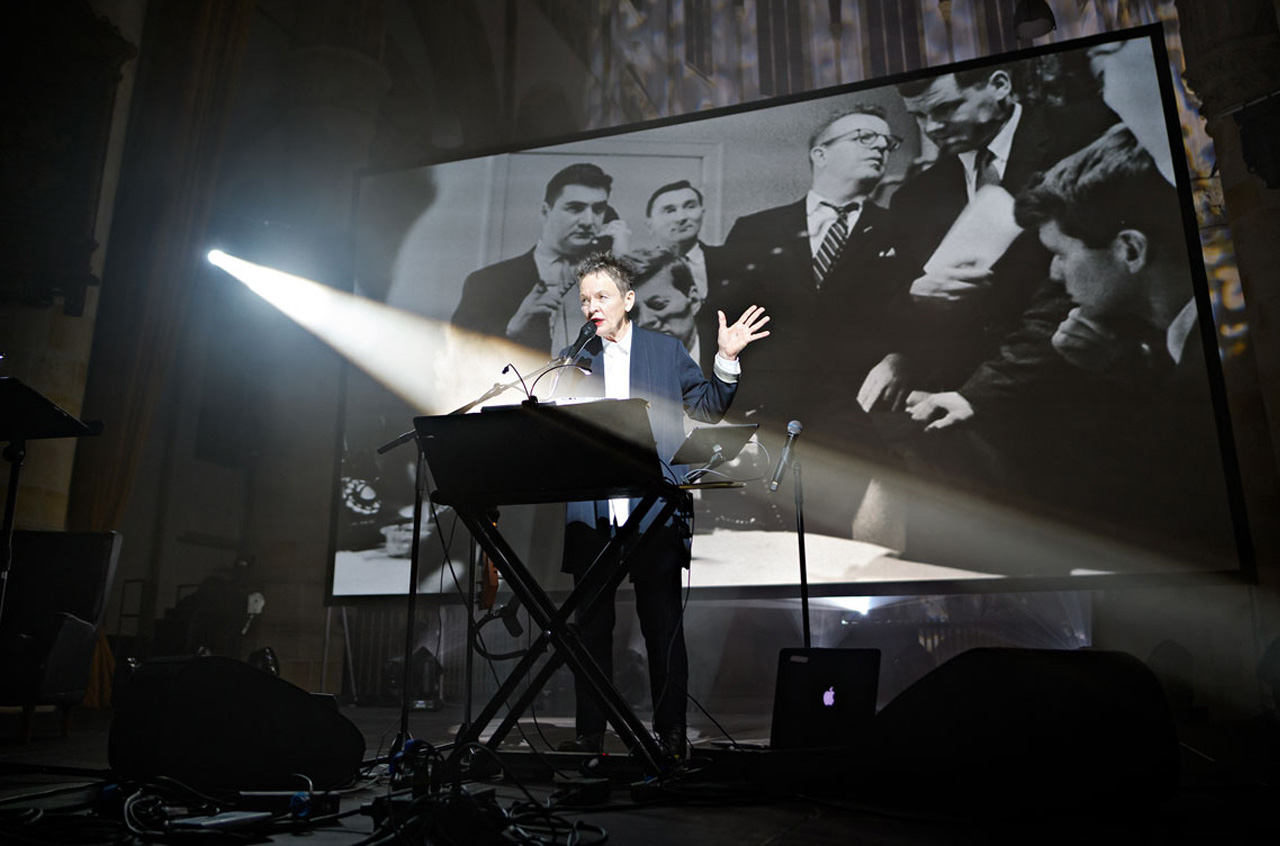 Ammar 808 Tunisian beat maker Sofyann Ben Youssef resembles Egyptian Lover both in style and his instrument of choice: the Roland TR-808. Together with Algerian singer Sofian Saidi, gnawa-player Mehdi Nassouli and Tunisian vocalist Cheb Hassen Tej, he played for a way-over-capacity Paard Van Troje on Friday night. People were pushed onto the walls of the small room and I could hardly keep my feet on the floor. Dressed in a golden sequin jacket, Youssef created a structure of heavy beats, complemented by Saidi's hypnotizing singing and Nassouli's infectious smile. The rapid strumming of the gnawa and bass was answered by handclaps from Hassen Tej. Together they created what sounded like a nocturnal jam session in the desert. The psychedelic, high-energy blend of beats from the Maghreb and the acoustic duet on flutes was completely mesmerizing.
Ammar 808 Tunisian beat maker Sofyann Ben Youssef resembles Egyptian Lover both in style and his instrument of choice: the Roland TR-808. Together with Algerian singer Sofian Saidi, gnawa-player Mehdi Nassouli and Tunisian vocalist Cheb Hassen Tej, he played for a way-over-capacity Paard Van Troje on Friday night. People were pushed onto the walls of the small room and I could hardly keep my feet on the floor. Dressed in a golden sequin jacket, Youssef created a structure of heavy beats, complemented by Saidi's hypnotizing singing and Nassouli's infectious smile. The rapid strumming of the gnawa and bass was answered by handclaps from Hassen Tej. Together they created what sounded like a nocturnal jam session in the desert. The psychedelic, high-energy blend of beats from the Maghreb and the acoustic duet on flutes was completely mesmerizing.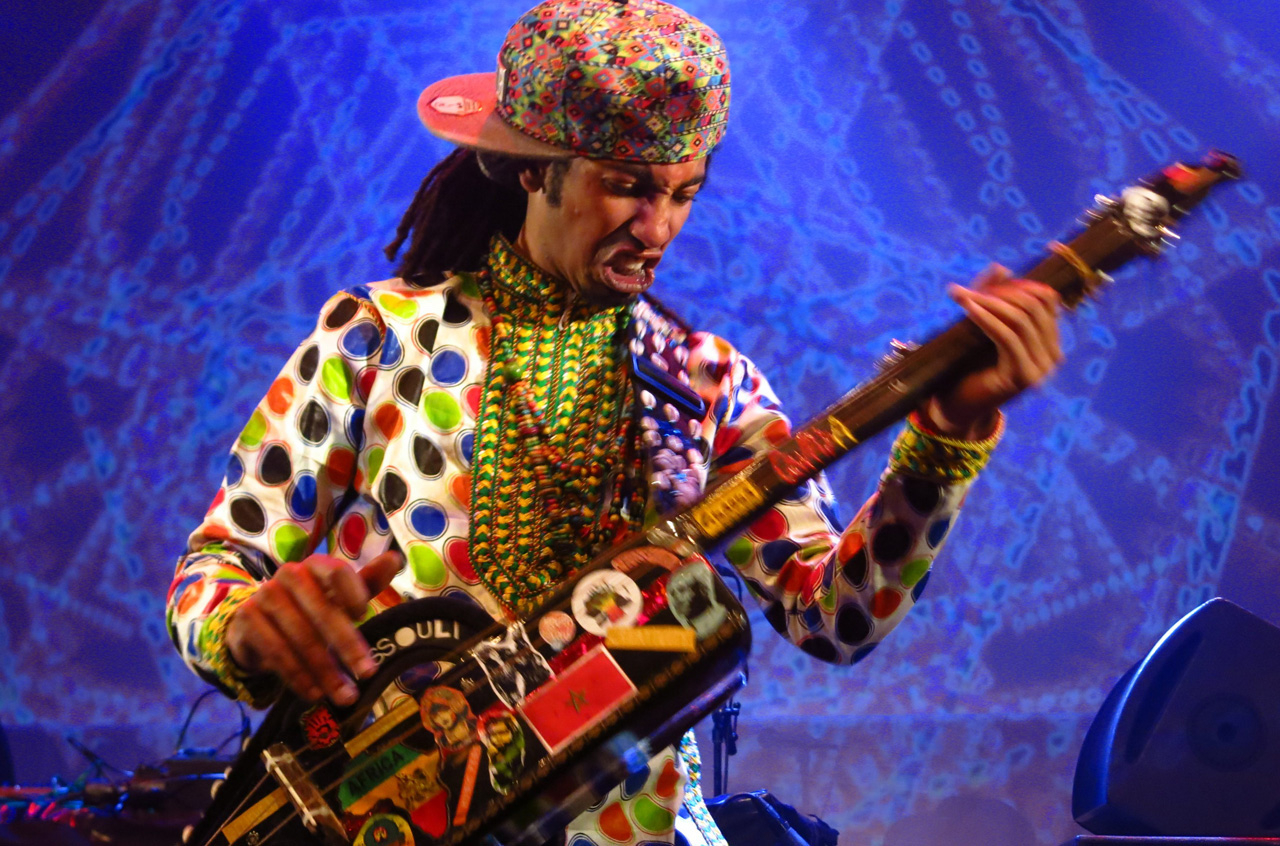 JASSS For the first track on her upcoming Dekmantel compilation, Lena Willikens chose a production from Silvia Jiménez Alvarez, better known as JASSS. That track, "Little Lines," had a similar vibe to her live set at Rewire on Friday: fragmented voices, hissing hats, frolicking rhythms. The atmosphere was brooding, even grim at times, with distorted synth strokes that sounded like whipping leashes. Looming over her analogue equipment, Alvarez seemed always to be moving forward into her dense soundscapes. The music was mysterious, fractured and a bit subdued, glued together with long synth tones. The rhythms were pleasantly free—it felt as if they really were the result of spontaneous experimentation.
JASSS For the first track on her upcoming Dekmantel compilation, Lena Willikens chose a production from Silvia Jiménez Alvarez, better known as JASSS. That track, "Little Lines," had a similar vibe to her live set at Rewire on Friday: fragmented voices, hissing hats, frolicking rhythms. The atmosphere was brooding, even grim at times, with distorted synth strokes that sounded like whipping leashes. Looming over her analogue equipment, Alvarez seemed always to be moving forward into her dense soundscapes. The music was mysterious, fractured and a bit subdued, glued together with long synth tones. The rhythms were pleasantly free—it felt as if they really were the result of spontaneous experimentation.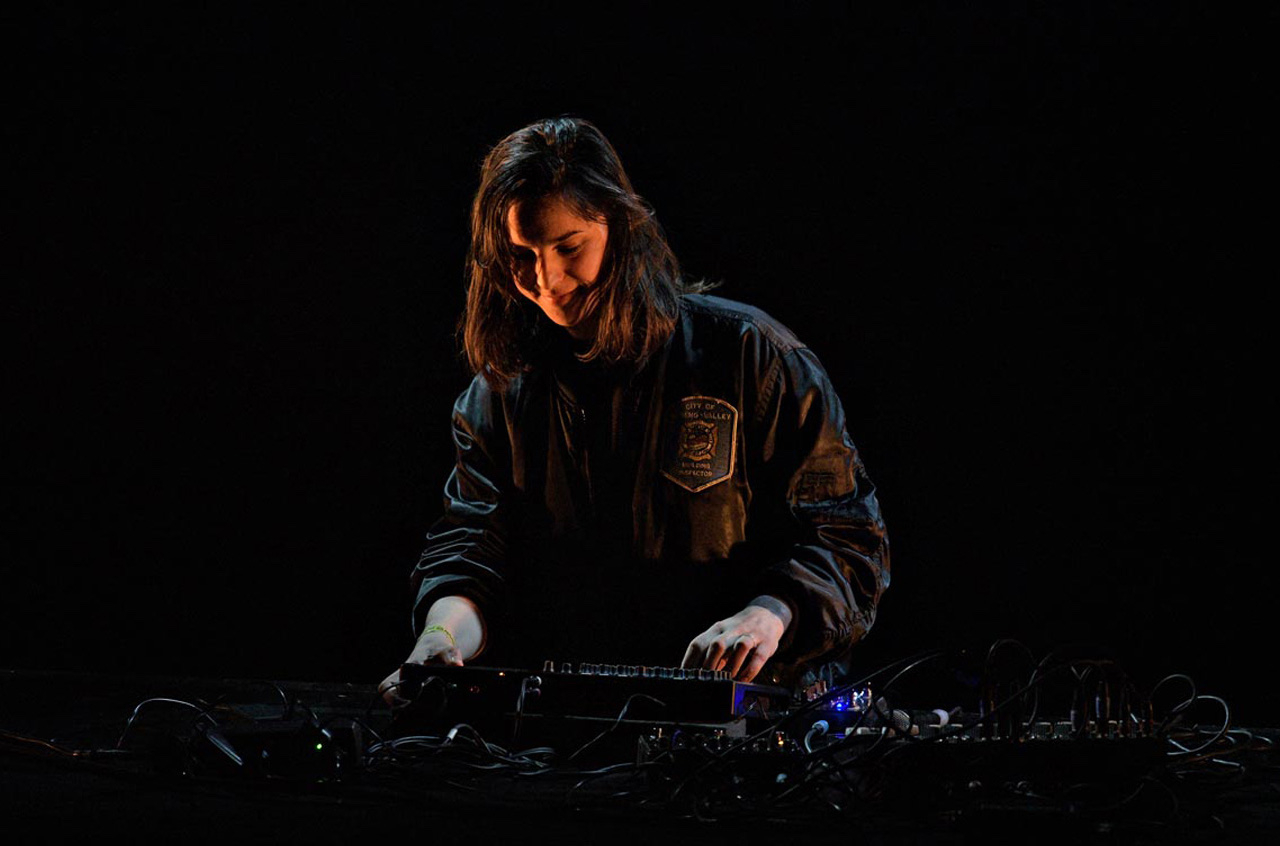 Mykki Blanco & Lyzza When SOPHIE cancelled, Mykki Blanco stepped in only hours before the start of the festival. The queer rapper's debut performance at Rewire was two years ago, and this set proved she's since matured as an artist. She wasted no time, climbing on top of the DJ booth and rapping about egoism, before dropping back down and arching her back on top of the podium speakers. As Blanco freestyled the lyrics to Cardi B's "Bodak Yellow," Lyzza, who was DJing, responded by playing the track. Then, Blanco made the audience her catwalk, parading over to the bar, ordering a drink and emptying a bucket of ice on her head. (She was largely invisible for a full ten minutes after that.) It was as if she wanted to give the floor to the future generation and pay her respects to a new star in the making: Lyzza. The young DJ started stitching together Latin beats and ravey synths, including a daring combination of a samba beat and Zombie Nation's "Kernkraft 400." She followed up with Latin brass sounds and r&b vocals, including—why not—a rave alarm. Needless to say, the crowd went wild.
Mykki Blanco & Lyzza When SOPHIE cancelled, Mykki Blanco stepped in only hours before the start of the festival. The queer rapper's debut performance at Rewire was two years ago, and this set proved she's since matured as an artist. She wasted no time, climbing on top of the DJ booth and rapping about egoism, before dropping back down and arching her back on top of the podium speakers. As Blanco freestyled the lyrics to Cardi B's "Bodak Yellow," Lyzza, who was DJing, responded by playing the track. Then, Blanco made the audience her catwalk, parading over to the bar, ordering a drink and emptying a bucket of ice on her head. (She was largely invisible for a full ten minutes after that.) It was as if she wanted to give the floor to the future generation and pay her respects to a new star in the making: Lyzza. The young DJ started stitching together Latin beats and ravey synths, including a daring combination of a samba beat and Zombie Nation's "Kernkraft 400." She followed up with Latin brass sounds and r&b vocals, including—why not—a rave alarm. Needless to say, the crowd went wild.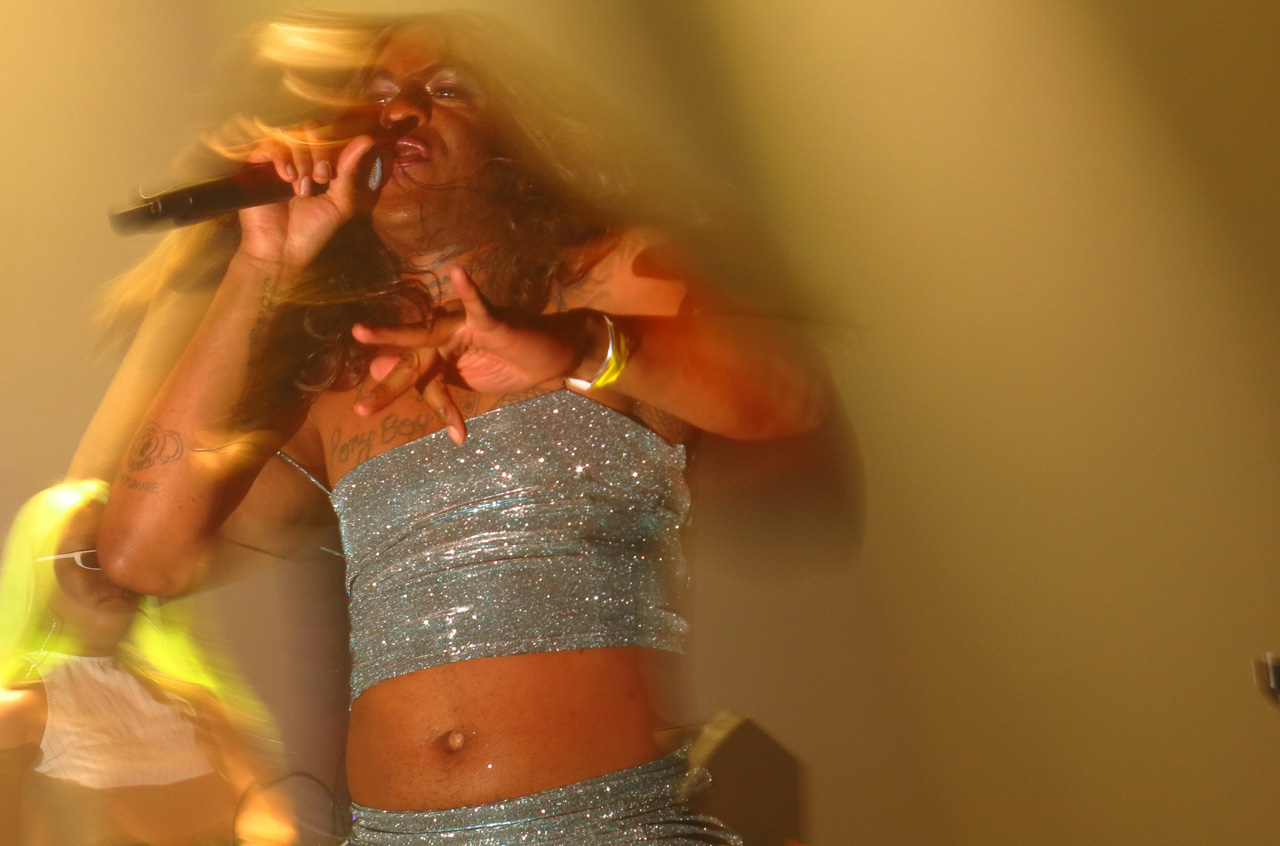 Karen Gwyer On her latest album, Rembo, Karen Gwyer moved more towards body music than ever before. Her live set reflected this change, as energizing as it was bass heavy. That said, she can make a fat bassline feel like the stroke of a butterfly wing. The fast speed at which she played her tracks—all from Rembo, many in the same order—kept it playful and light. Tracks like "Why Does Your Father Look So Nervous?," with its rapid melody, made the crowd move fiercely. She went on to play the very danceable acid techno cut "He's Been Teaching Me How To Drive," while her closer, "Yes But I Didn't Know They Were Owls," with its pulsating broken rhythms and silky smooth outro, was downright touching. Photo credit / Parcifal Werkman - Lead Pieter Kers - Laurie Anderson, JASSS Rene Passet - Rest
Karen Gwyer On her latest album, Rembo, Karen Gwyer moved more towards body music than ever before. Her live set reflected this change, as energizing as it was bass heavy. That said, she can make a fat bassline feel like the stroke of a butterfly wing. The fast speed at which she played her tracks—all from Rembo, many in the same order—kept it playful and light. Tracks like "Why Does Your Father Look So Nervous?," with its rapid melody, made the crowd move fiercely. She went on to play the very danceable acid techno cut "He's Been Teaching Me How To Drive," while her closer, "Yes But I Didn't Know They Were Owls," with its pulsating broken rhythms and silky smooth outro, was downright touching. Photo credit / Parcifal Werkman - Lead Pieter Kers - Laurie Anderson, JASSS Rene Passet - Rest